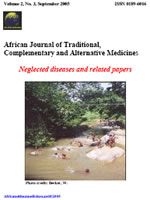
|
African Journal of Traditional, Complementary and Alternative Medicines
African Ethnomedicines Network
ISSN: 0189-6016
Vol. 14, No. 5, 2017, pp. 147-155
|
 Bioline Code: tc17068
Bioline Code: tc17068
Full paper language: English
Document type: Research Article
Document available free of charge
|
|
|
African Journal of Traditional, Complementary and Alternative Medicines, Vol. 14, No. 5, 2017, pp. 147-155
| en |
ANTIOXIDANT PROPERTIES OF DICHROCEPHALA INTEGRIFOLIA  (ASTERACEAE) IN A MOUSE MODEL OF MONOSODIUM GLUTAMATE-INDUCED NEUROTOXICITY (ASTERACEAE) IN A MOUSE MODEL OF MONOSODIUM GLUTAMATE-INDUCED NEUROTOXICITY
Kouémou, Emégam Nadège; Dongmo Nguepi, Mireille Sylviane; Fotio Lambou, Agathe; Moto Okomolo, Fleur Clarisse; Taiwe Sotoing, Germain; Pahaye Bougolla, David; Pale, Simon; Njapdounke Kameni, Jacqueline Stephanie & Ngo Bum, Elisabeth
Abstract
Background: In Africa, neurodegenerative diseases in the elderly have become a major health concern due to the increase
in live expectancy. Glutamate mediated neurotoxicity is involved in neurodegenerative diseases such as Ischemia, Epilepsy,
Alzheimer’s and Parkinson diseases. Plants with antioxidant properties are reported to protect vital organs against
glutamate toxicity. This study aims to assess the effect of Dichrocephala integrifolia against monosodium glutamatemediated
neurotoxicity and oxidative stress.
Methodology: The decoction prepared from the leaves of Dichrocephala integrifolia was evaluated against monosodium
glutamate-induced neurotoxicity in mice. The animals were grouped in seven groups of 6 animals each. The animals
received daily; distilled water (p.o) for the distilled water and the negative control groups, one of the four doses of the
decoction of the plant (35, 87.5, 175 or 350 mg/kg p.o) for the tests groups and memantine (20 mg/kg p.o) for the positive
control group. Monosodium glutamate (2.5 g/kg ip) was injected daily to animals except those of the normal control group
all the seven days of the experimentation. Animals were observed for aggressiveness, locomotor and forepaws muscle grip
activities 30 min after monosodium injections. Brain reduced glutathione and malondialdehyde levels were also assessed
following the behavioral tests on day 8.
Results: The decoction of Dichrocephala integrifolia at the doses of 87.5 and 175 mg/kg significantly (p<0.01) inhibited
the aggressiveness of monosodium treated mice, significantly (p<0.01) counteracted the reduction in locomotor and
forepaws muscle grip capacity induced by monosodium glutamate. Furthermore, the decreases in reduced glutathione level
and increases in lipid peroxidation level induced by monosodium glutamate were significantly (p<0.001) reversed by
Dichrocephala integrifolia at the doses of 87.5 and 175 mg/kg.
Conclusion: The results of this study reveal that Dichrocephala integrifolia is a medicinal plant that protects the brain
against monosodium glutamate-mediated neurotoxicity. This can explain why this plant is intensively used in folk medicine
in Cameroon to prevent and treat some central nervous system illnesses.
Keywords
Neurotoxicity; Glutamate; Dichrocephala integrifolia; antioxidant
|
| |
© Copyright 2017 - African Journal of Traditional, Complementary and Alternative Medicines
Alternative site location: http://journals.sfu.ca/africanem/index.php/ajtcam
|
|
